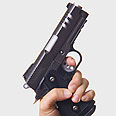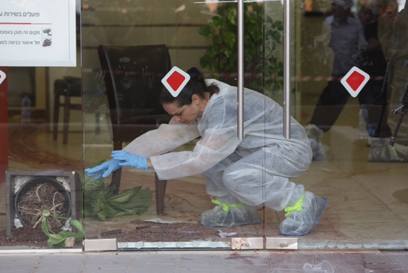
Israel conducts illegal weapons amnesty
Public Security Ministry promises anyone who hands over unlicensed gun will not be prosecuted; some 6,500 Israelis yet to renew their gun licenses
There are a lot of guns in Israel. You see them carried by soldiers as you walk down the street; on the hip of the security guard checking your bag as you enter the bank; and even by licensed civilians who live in or travel through areas Israel acquired in the 1967 war.
Israel’s Ministry of Public Security has embarked on an amnesty campaign to collect illegal, unlicensed firearms, promising that anyone who hands over their unlicensed gun will not be prosecuted. Unlike similar campaigns in the US, where the concern is violent crime, misuse of firearms is a greater problem relative to suicides.
Related stories:
- Op-ed: Just talk
- Bank gunman in 2011: Need firearm to protect myself
- Union moves to instill gun control for security guards
Yakov Amit, the head of firearm licensing in the Ministry says there are 160,000 licensed civilian weapons in Israel, along with 130,000 guns licensed to institutions such as security companies. According to law, Israelis must renew their gun permits every three years, including a requirement for shooting practice.
According to officials, there are about 6,500 Israelis who have not renewed their gun licenses.
“It is likely that these guns were stolen and they’re afraid to report it or they were sold illegally,” Amit told The Media Line. “We want to know how many people have done this. They must report it but there won’t be any criminal proceedings against them.”
In the first week of the campaign, which began earlier this month, 200 Israelis came forward. Since then, there have been dozens more, although complete statistics are not yet available.
The issue gained prominence here earlier this month when a disgruntled customer opened fire in a bank in the southern Israeli city of Beersheba, killing four people before turning the gun on himself. The gunman, Itamar Alon, was a former security guard who had won a commendation from the city for preventing a terrorist attack years ago.
His gun, Amit said, was licensed.

Scene of Beersheba bank shooting (Photo: Ohad Zwigenberg)
The shooting dominated the Israeli news for days, ironically pointing out how rare gun violence is in the country. Israeli officials say the difficult process required in order to obtain a gun weeds out potential misuse.
“Unlike in the US, in Israel there is no legal right to (own or carry) a gun,” Amit said. “Anyone who wants a gun needs to submit a request and explain why he needs that gun. He also has to undergo physical and psychological tests.”
Israel’s Ministry of Health is legally bound to report any changes in psychological health that could impact on a gun owner’s ability to use the weapon safely.
Anyone living in post-1967 areas, or on Israel’s northern and southern borders, is reasonably likely to obtain a license for a firearm, as well as people involved in businesses that include risk, like diamonds or money-transfer.
Most Israelis are familiar with guns from their mandatory army service. With the exception of ultra-Orthodox Jews and Arab citizens, all Israelis are drafted at the age of 18 and serve in the army – men for three years and women for two years. Even those in non-combat jobs complete at least three weeks of basic training that includes firing assault rifles.
Although violent crime involving gun use is considered rare in Israel, guns feature heavily in the high rate of suicide in both the civilian and military sectors.
The army does not like to release statistics, but after a blogger writing under a pseudonym wrote on the issue last year, the army revealed that 237 servicemen and women took their own lives over the past 10 years, the vast majority using their army-issued weapons.
“There is a dangerous cultural combination of easy access to guns and the lack of awareness of depression and its prevalence in the 18 to 26 age group,” Sara Halevi, an adolescent cognitive behavioral therapist in Jerusalem told The Media Line. “That lends itself to a situation where suicide is unfortunately far too common.”
Halevi said she has noticed an increase in depression and stress-related illnesses in her practice, especially among 17-year-olds just before they enter the army.
“They feel unprepared for the responsibility that they are going to have put on them,” she said. “I’ve seen the incidence of depression go up significantly.”
There is still a stigma in Israel against seeking treatment, and many young Israelis worry that seeing a therapist could keep them out of important army jobs.
The army is also working to combat suicides of soldiers on active duty. In the past, most soldiers would bring their guns home with them when they came home for the weekend. Now, since the army began requiring that most soldiers keep their guns on their bases when on leave, suicides have decreased significantly.
Article written by Linda Gradstein
Reprinted with permission from The Media Line
- Receive Ynetnews updates directly to your desktop










